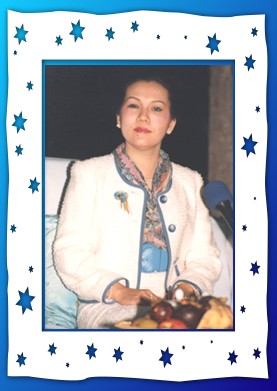When
we're independent, we're aware of our abilities, intelligence and
shortcomings and thus know how to deal with them. Otherwise, we have
no chance to use our wisdom, so it may become blunted. Hardships and
uncomfortable or imperfect situations are just what benefit us most.
You should not think that crossing your
legs and meditating is all there is to spiritual practice. No, it's
not true! In this way, we cannot utilize our wisdom, which only makes
sense when it's being used. Suppose you live in this way: You stay
in the mountains and lock yourself up in meditation, which takes you
to very high levels and beautiful visions, and then you eat after
meditation, and go back again to your high levels. Does this kind
of life benefit our society in the physical aspect? No! Does your
wisdom benefit anyone? No! It's said that working is also a kind of
Zen, and so are eating and sleeping.
Whenever you work, it's your inner Master
who works, not your physical body. So, when working, we should be
aware and bear in mind that it's our inner Master who works with our
hands the whole time. For instance, if we see that there is no water
here but there are many people who have to use the bathroom, the inner
Master will think of a solution. This place should be enlarged; the
grass over there has to be cut, and some more bathrooms and several
faucets need to be installed.

You always spoil yourselves, which is
why your wisdom doesn't develop. You see, all the enlightened Saints
throughout history have trained themselves or have been trained in
unfavorable situations before getting enlightened. Even if they did
not train themselves on purpose, they would be trained by the situations
in their lives in order to become enduring persons.
You may find it hard to believe if I
tell you all the hardships I have undergone since I was a child. You've
heard that I was born into a well-to-do family and remained wealthy
after being married, but these are just a part of my life. For example,
people asked me, "Where are you from, Master?" Of course,
I answered, "I'm from Au Lac." "What did your parents
do?" I said, "They were doctors of Chinese Medicine."
Then they asked, "Were you married?" and I said, "Yes."
"Any children?" I said, "No." "What did your
ex-husband do?" I said, "He was a doctor." Then they
ask, "What kind of doctor?" and I said, "He was a dentist
and a surgeon as well."
So people assembled these answers and
wrote my biography. But the information in it wasn't complete. As
for my "real biography," you wouldn't believe it. So it's
enough to be like that; otherwise, it could make a big book! Actually,
I have suffered much since I was very young, not because of the circumstances,
but because I liked to train myself in unfavorable situations. At
the time, I did not really feel any pain, but now when I look back,
I find them very torturous!
Thus, in unfavorable situations your
wisdom lights up, and becomes quiet and thoughtful, then you know
what the Truth is. It's your real Self who thinks when you're thinking.
And so does your real Self arrange these situations. Why? Because
at such times you suffer from your previous karma, which was caused
by you. For example, your true Self "arranges" that someone
comes to punish you or scold you by creating an unpleasant condition.
Actually, this is caused by your own karma. It's arranged in this
way by your true Self.
Let's say you physically attacked many
people in a previous life. If you're going to be liberated in this
lifetime, the previously attacked people will complain in their souls,
and you'll know it in your soul. Your true Self knows it by recording
the condition with a special machine, which records everything in
a fair way so you understand that you should let the previously attacked
people seek revenge. That's the way it is. Therefore, you should know
it's you scolding yourself when someone else scolds you, and you shouldn't
blame anyone else.
Sometimes people come to see me, and
look sweet and humble as if they prostrate themselves as soon as they
see me. But I still scold them whenever I see them. You don't understand
this, but it's OK, because you can't penetrate the subtle karma and
ego, or the delicate causes and effects. You only see the superficial
instead of the essential. That's why you think these people are good.
On the contrary, some of you may look coarse outside, but are very
good inside. We come to know about this after we spend some time with
them. Have you ever had this kind of experience? (Audience: Yes.)
That's what I said.


